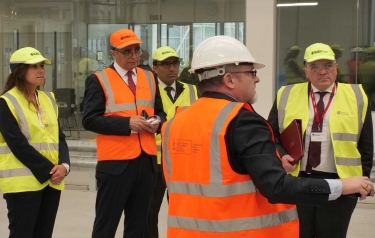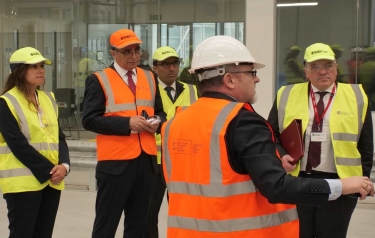29 July 2025
A new 1.5m government-funded project at the University of Sheffield aims to accelerate the development of clean aviation technologies. Mike Kane MP visits Sheffield
Mike Kane MP visits Sheffield
Announced by the Aviation Minister, Mike Kane MP, the University of Sheffield will lead a £1.5 million project to commercialise its new SAF production technology and attract investors to build SAF production plants in order to boost the supply of the cleaner fuel to the aviation industry.
The project will be delivered by a consortium, including Fuel Cell Energy (US), Green Lizard Technologies (UK), Drax Power (UK), IMI Vivo (Italy), Gardner Consulting (UK), and Leeds Bradford Airport (UK), and received letters of support from Airbus, Boeing, City of Doncaster Council and Qatar Airways.
SAF is typically produced using bio or waste feedstock. However, there are concerns over whether a sufficient level of feedstock is possible to establish and maintain.
The University of Sheffield’s new production pathway eliminates this reliance as it can produce SAF using a combination of renewable energy sources and next generation carbon capture technology.
The pathway is called Power to Liquid (PtL). It uses renewable electricity to produce hydrogen and captures carbon dioxide from the atmosphere or industrial processes. The hydrogen and CO2 are then combined to create synthetic hydrocarbons, which can be refined into SAF.
This pathway could enable cost-competitive SAF production, offering operational flexibility while also decarbonising industrial appliances.
The Sheffield-led project, called NextGen-SAF, aims to build a world first demonstration plant combining two innovative technologies to produce SAF – a Molten Carbonate Fuel Cell (MCFC) and an Advance Fischer-Tropsch (AFT) reactor.
The fuel cell can generate hydrogen and capture CO2, and the reactor converts the mixture into the synthetic hydrocarbons that are then refined into SAF.
The plant will demonstrate the operability, reliability and performance of the integrated system so the method can be scaled up.
Professor Koen Lamberts, President and Vice-Chancellor of the University of Sheffield, said: “We are proud to lead this project, made possible by this vital funding, to develop a new and innovative SAF production pathway.
“Sustainable aviation fuel is essential to reducing emissions from the aviation industry and through this project, we are taking a major step toward scaling up SAF production right here in the UK.
“This initiative not only advances the UK’s goals around SAF but also strengthens the nation’s fuel production capabilities and will deliver lasting economic benefits.”
Announcing £63 million of funding for 17 projects to accelerate SAF production, Aviation Minister Mike Kane said: “This £63 million is liftoff for Britain’s green aviation revolution.
“We’re not just backing brilliant British innovation, we’re creating thousands of high-skilled jobs and positioning the UK at the forefront of the global sustainable aviation market.
“From the labs of Sheffield to the runways of the future – this is how we kickstart economic growth, secure energy independence, and make Britain a clean energy superpower.”
The University of Sheffield’s Energy Innovation Centre is home to some of the most advanced clean energy research facilities in Europe.
This offers pilot-scale testing facilities that enable academics and businesses to collaborate to test new clean energy technologies, including sustainable aviation fuel, before scaling up and commercialising.
The University hosts the UK SAF Clearing House – one of only two centres in the world – that supports fuel producers in obtaining the certification needed for use in the aviation industry.
Sheffield was also part of a consortium that delivered the world’s first transatlantic flight powered by sustainable aviation fuel.
Researchers from the University analysed the impact of SAF on the flight’s particulate emissions and contrail formation using the unique SAF research facilities at the Energy Innovation Centre. The results demonstrated up to a 70 percent reduction in emission levels.
Professor Mohamed Pourkashanian, Managing Director of the University of Sheffield’s Energy Innovation Centre, who is leading the project, said: “It is fantastic to see the University of Sheffield playing a leading role in the development of sustainable aviation fuel and supporting the aviation industry in its efforts to reduce its emissions.
“At Sheffield, we have some of the most advanced SAF research facilities in Europe and are excited to work with partners from the industry to help them test and develop new fuels and next-generation clean energy technologies.”
